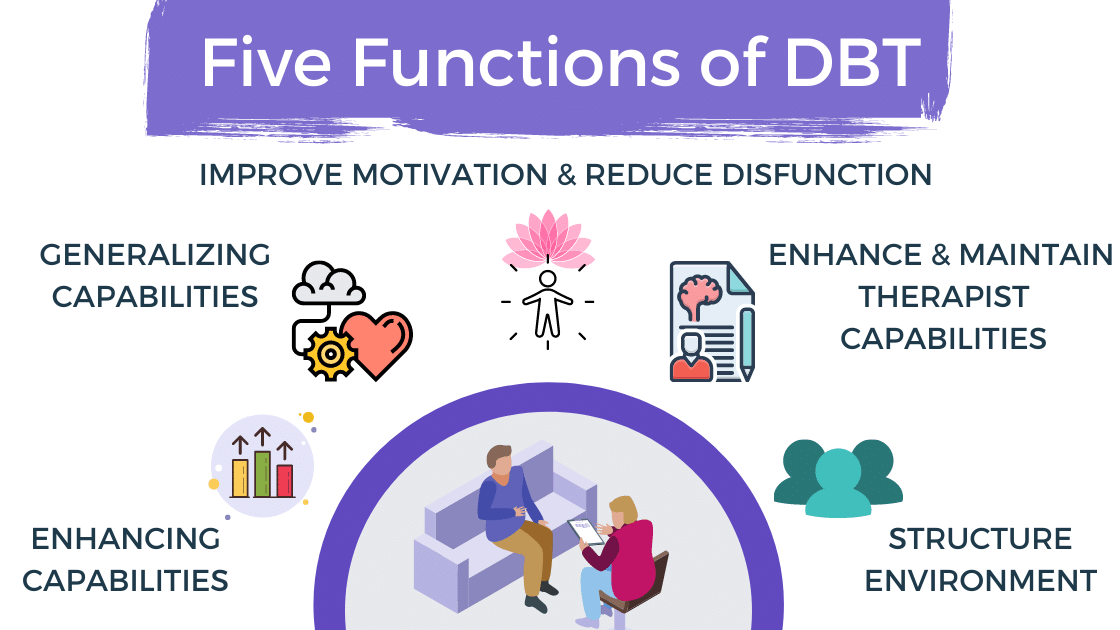Dialectical Behaviour Therapy (DBT)
Develop skills to manage stress and thrive with DBT Therapy

Although people often talk about therapy as though it were just one thing, the truth is that there are many different styles practitioners can use to help people improve their mental health. There's a good reason for the range of therapeutic approaches; mental health isn't a one-size-fits-all situation.
Among the options to consider is Dialectic Behaviour Therapy (DBT), which is one of the approaches that we offer at Trillium Counselling. Here's a look at what DBT is and how it can help.

What is Dialectic Behaviour Therapy?
Before we talk about what DBT can do, let's dig into what it is. DBT was originally created to address the needs of patients with borderline personality disorder (BPD), especially women who had demonstrated suicidal behaviours. BPD is notoriously difficult to treat.
This evidence-based approach has not only been shown to help people in that specific population, but its use has also been expanded to support people with other conditions too. It's been demonstrated to be effective in patients with substance-use disorders, binge-eating disorders, depression, and PTSD.
Dialectical Behaviour Therapy was founded by Dr. Marsha Linehan in the late 1980s, as a professor of psychology at the University of Washington. with its original intent to treat those with Borderline personality disorder and suicidal ideation. Marsha Linehan also founded Behavioural Tech which is an institute developed specifically to train therapists to work with complex disorders using scientifically valid treatments, such as DBT.
DBT is a form of Cognitive Behavioural Therapy, and it emphasizes helping the patient to accept themselves, their feelings and thoughts, and the world as it is in the moment. Find out more on the differences between CBT and DBT <-- Here
The goal of DBT Therapy is to teach clients to regulate and understand their emotions, deal with stress, and form healthier relationships.
DBT Therapy Techniques
DBT is grounded in helping individuals navigate and regulate overwhelming emotions. At Trillium Counselling, our therapists support you in developing mindfulness skills—fostering a compassionate, non-judgmental awareness of your experiences and emotional state. This intentional presence empowers you to manage strong feelings and respond thoughtfully, rather than feeling trapped by automatic reactions.
Our team guides you in building resilience when facing distress, introducing healthy strategies that move away from old patterns. We also focus on strengthening communication and relationship skills, equipping you to connect respectfully, listen deeply, and handle challenging interactions with greater confidence and care.
DBT Therapy Skills

1. Strengthen Mindfulness
In order to strengthen mindfulness skills, a therapist could walk a patient through breathing exercises that they can turn to in difficult moments. Practicing these skills during calm times helps people remember how to use them when they're feeling difficult emotions.

2. Distress Tolerance
To help a patient boost their distress tolerance, a therapist might coach them in non-harmful ways they can distract themselves when painful feelings are high. For example, they could simply get up and walk around to give their emotions time to subside and become more manageable.

3. Emotional Regulation
Emotional regulation teaches us skills to help manage and mitigate intense emotions. DBT helps clients develop strategies to regulate their emotional states (anger, depressed, anxious, intensely frustrated etc.). Developing this skillset includes
- Identify and label emotions (increase mindfulness to current emotions)
- Reduce vulnerability to the emotional mind
- Identify obstacles to changing emotions

4. Interpersonal Effectiveness
Interpersonal effectiveness can improve by learning different ways to interact. A therapist might offer the acronym GIVE to remind a patient to be Gentle, show Interest in others, Validate others' feelings, and have an Easy attitude.
These are some pretty big concepts, but how does it work in practice? DBT can be used in individual therapy or group therapy settings, but in either setting, it includes activities to help patients learn how to apply them to their lives. Here are a few examples of techniques therapists may use to help patients develop these skills.
Lets us Help you Find the Right Match
How Does DBT Therapy Work?
Whatever specific techniques are used, there are five basic functions that DBT seeks to fulfill.

DBT Therapy Steps - The Five Components of Treatment
1. Enhancing capabilities
Therapists approach DBT from the standpoint that patients lack certain life skills, such as emotional regulation. Rather than exploring the historical reasons for these gaps in their understanding, they focus on learning and using these skills.
2. Generalizing capabilities
It's great to understand a different approach--such as choosing not to react in a way that will make a difficult moment worse--but if you forget that new approach the moment you start arguing with your partner, it's not very helpful. One of the goals of therapy is to learn to use these new skills in real-life situations.
3. Improve motivation and reduce dysfunctional behaviours
Patients fill out self-monitoring forms to help them track their progress in their treatment goals. The therapist uses this information to guide the session focus, helping the patient understand their choices in different situations. They work on the skill that could help them in those situations.
4. Enhancing and maintaining therapists' capabilities and motivation
This largely applies to therapists who work with patients with BPD. Professional support and guidance helps therapists maintain their focus and goals.
5. Structuring the environment
The patient learns within a supportive therapeutic setting how to manage their own environment to support their goals. This can be as simple as learning not to engage in difficult discussions when they're tired, or as involved as disengaging from social circles that encourage self-destructive behaviour.
Support Starts Here
With DBT, you can reduce distress, build resilience, and live with greater stability. Reach out to schedule your first session.
A Few Things to Consider
Although DBT shows a lot of promise in helping patients live calmer, happier lives, there are a few things to think about before deciding if it's for you.
First of all, it isn't a quick fix. To benefit from DBT, you'll have to invest time and effort. It requires patients to do work outside of therapy sessions. These exercises help you develop the skills you're working on, and they're the best way to achieve the progress you're seeking.
It can also be difficult to confront painful emotions, but coping with these feelings is a central goal of DBT. An experienced therapist will help you navigate these challenges, but only you know if you're ready to take them on.
Criticism of DBT Therapy
Although DBT therapy was originally developed specifically for use with Borderline Personality Disorder (BPD), it has since become more mainstream in its use of other mental health issues such as depression and trauma. It has been pointed out however that DBT should not necessarily be used as the only method for those with trauma as there is no element of trauma processing. Other therapeutic techniques such as EMDR or CBT would be of better use for those instances. Often a therapist would use an eclectic approach with a client and draw from a number of different methods with DBT being another tool in the toolbox.
Is DBT the Right Approach for you?
Many people have turned to DBT to gain important skills that help them live happier, healthier lives. In the hands of a skilled therapist, it can help patients free themselves of being controlled by their emotions, so they can choose the life they want.
If you're interested in DBT or want more guidance to decide if it's the best choice for you, contact us for more information. Our therapists are happy to share their expertise and help you start your journey to find the mental wellness you're searching for.
FAQs
Therapy works best when the 'fit' is right with your therapist. That’s why we carefully match you with someone whose expertise fits your needs and preferences. Building a strong therapeutic relationship is key to creating a supportive and effective experience.
Before meeting your therapist, you’ll complete a brief intake form. Your first 50‑minute session focuses on what brings you in, your goals, relevant history, and what success would look like. We’ll explain confidentiality and co‑create a plan so you know what comes next. It’s normal to feel nervous—your therapist will guide the pace.
The frequency of sessions depends on your needs and goals. Many people start with weekly or bi-weekly appointments and adjust as they make progress. The total number of sessions is unique to you—your therapist will work with you to find the right approach.
In DBT therapy at Trillium Counselling, you’ll partner with a compassionate therapist to develop practical skills that empower you to navigate emotions and enrich your everyday life. Each session supports growth in four key areas:
Mindfulness – techniques to stay present and connected with yourself.
Distress Tolerance – strategies to manage overwhelming emotions and challenging situations with greater calm and confidence.
Emotion Regulation – guidance to recognize and respond to feelings in healthier, more effective ways.
Interpersonal Effectiveness – support to enhance communication, establish boundaries, and foster more meaningful relationships.
Rather than avoiding or suppressing difficult emotions, DBT encourages you to approach them with understanding, so they no longer dictate your responses. As you move forward, you’ll cultivate resilience, find relief from emotional distress, and move towards a more balanced, rewarding life.
Most of our services are covered by extended health benefit plans. Coverage varies with every plan, so please check your specific plan or contact your provider to confirm your benefits.
Most employer benefits cover therapy with a Registered Social Worker (MSW, RSW) or a Registered Psychotherapist (RP). We can direct bill to most major insurers when your plan allows it; otherwise, we email insurance‑ready receipts after your session.

Last Reviewed Aug 5 2025 by Bradley Vasquez
Bradley is a Registered Psychotherapist (RP) with the College of registered Psychotherapists of Ontario (CRPO). He holds a Masters Degree in Counselling Psychology from Yorkville University, and a Bachelor of Arts in Psychology from the University of Waterloo. Bradley has a post-graduate certificate in DBT Therapy and training in various therapy modalities including EMDR Trauma Therapy.
Not sure yet? Let’s talk it through.
If you’d like to ask questions or explore your options first, book a free 20-minute matching consult or give us a call (226-752-8857) . One of our team members will help you find the right therapist and next steps that feel comfortable for you.
%20(1).png?width=200&height=80&name=Trillium%20Counselling%20Logo%20(999%20x%20398%20px)%20(1).png)

















